HEAT (1995)
A group of professional bank robbers start to feel the heat from police when they unknowingly leave a clue at their latest heist.
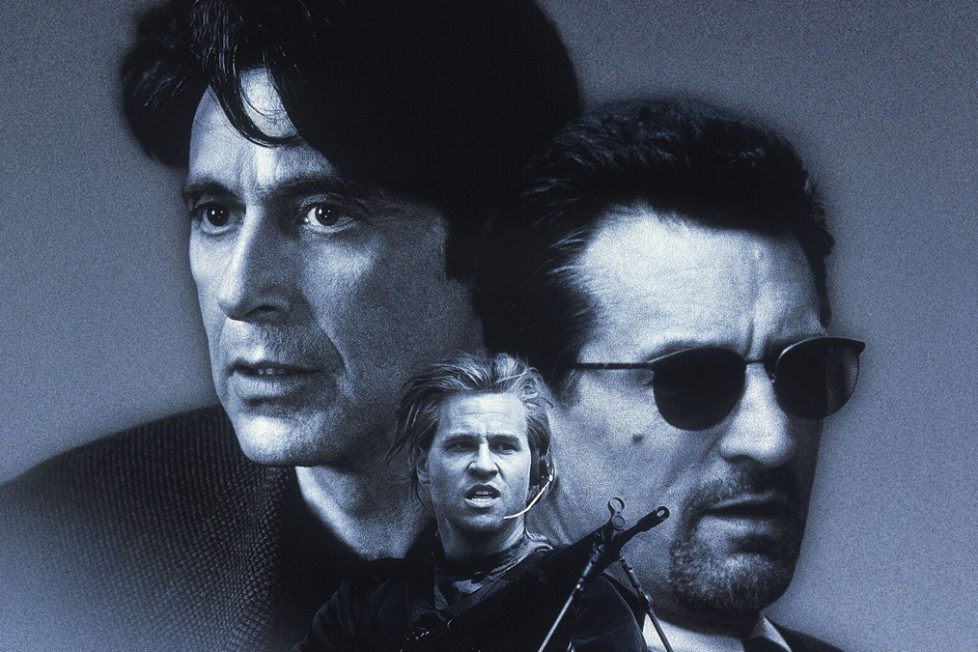
A group of professional bank robbers start to feel the heat from police when they unknowingly leave a clue at their latest heist.


One of the most anticipated films of 1995, Heat was an instant classic when it arrived in cinemas. Michael Mann’s elegant crime saga had it all: two great leads facing off against a gritty backdrop, exceptionally crafted action, and a multilayered story that delivered so much more than the average thriller. 25 years on and its appeal hasn’t waned.
It all began when Mann befriended former Chicago detective Chuck Adamson, who recounted a meeting between himself and criminal Neil McCauley at a diner during the 1960s. Even as they sat calmly across from each other, they had no illusions this conservation would change anything. yet they spoke frankly about their opposing duties. Intrigued by the story, Mann developed the idea into a script and used his TV Movie L.A Takedown (1989) as a practice run for what would become Heat.
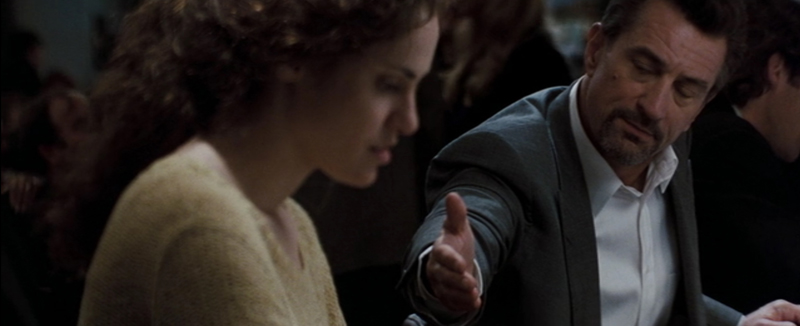
It’s a simple enough premise. Experienced thief Neil McCauley (Robert De Niro) leads a crew of criminals in Los Angeles, performing elaborate heists and living for the score. Police lieutenant Vincent Hanna (Al Pacino) is unable to make room for his deteriorating marriage to wife Justine (Diane Venora), such is his obsession with his job in the Major Crimes Unit. Both men are defined by what they do and struggle to connect to those around them. When a botched job lands McCauley’s crew on Hanna’s radar, McCauley and Hanna are prepared to see through the chase no matter the cost.
Alongside the leads is a fine ensemble cast—including Val Kilmer, Jon Voight, Ashley Judd, Tom Sizemore, Danny Trejo and Natalie Portman. Each character has their own vital part to play in the story and it rarely feels like the actors aren’t being utilised to their fullest. Kilmer and Voight are excellent foils to De Niro’s McCauley in their roles as criminal conspirators… while Judd, at first appearing shallow as Kilmer’s wife, provides one of the film’s most moving moments with the simple action of waving her hand.
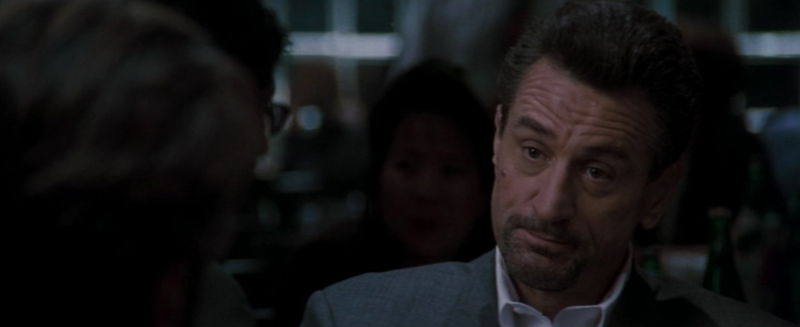
As excellent as the supporting cast are, this is De Niro’s movie. There’s an aching sorrow to Neil McCauley and his restrained performance never lets the audience forget it. One look into his eyes tells you his claim he’s “alone, not lonely” is completely hollow. He’s all too aware of the danger his chosen profession brings to those around him so he’s chosen solitude; a choice that’s as much about damage control as it is preservation. Yet the need to be close to someone overwhelms him, culminating in his romance with sheltered bookshop employee Eady (Amy Brenneman). As McCauley falls for her, it’s hard not to root for them both, even knowing it won’t end well. De Niro humanises his character without glorifying his violent actions, creating a portrait of a deeply damaged and despondent man.
Unfortunately, Pacino’s performance is more uneven and often hammy, particularly in scenes of police work where he tends to start bellowing in a bizarre manner. The actor’s justification for playing Hanna this way was that his character was intended to be a “coke-head”, a claim backed by Mann. While that certainly feels accurate, his bug-eyed screeching about women’s asses feels out of place in this level-headed film. Thankfully Pacino manages to reign it in for vital moments, revealing a vulnerable side to Hanna, in scenes such as the reconciliation with his wife or comforting a victim’s distraught mother at a crime scene. Nevertheless, he’s truly at his best when opposite De Niro.
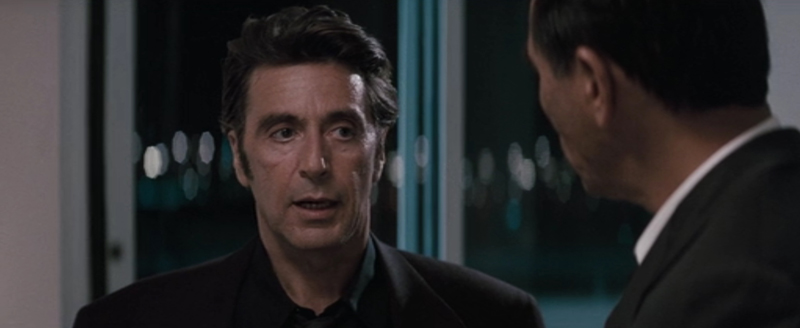
Even though they share little screen time together, De Niro and Pacino’s chemistry is unmatched. The diner scene where they finally talk face-to-face has become the stuff of cinema legend, and with good reason. It may feel hackneyed to some, decades later, but Heat takes an idea as simple as “these characters are two sides of the same coin” and transforms it into art.
The pair acknowledge they could be the downfall of the other and playfully offer pieces of information to see how much the other will reveal. They also trade insights into their psyches, sharing the nightmares and anxieties that suffocate them with a frankness that only kindred spirits could achieve. It’s masterful work that captures the bittersweet nature of their bond at its purest. There’s a shared respect between the two in spite of the inevitable reality one may have to kill the other. As the pursuit resumes, neither man takes any joy in what needs to be done. In Heat’s climax, the pair evade each other in an airfield cast in light and shadow, acting out the roles required of them till the bitter end. The accompaniment of Moby’s “God Moving Over the Face of the Waters” in their final showdown makes it all the more devastating.
Heat is successful in connecting its multiple storylines, but there are some that work better than others. Hanna’s stepdaughter Lauren (Natalie Portman) suffers a downward spiral designed to make him more sympathetic, but the progression of her story is rushed and it doesn’t feel earned. In contrast, the best subplot comes in the form of ex-con Donald Breedan (Dennis Haysbert), a buddy of McCauley’s stuck in a demeaning job with a corrupt boss. What appears to be a trivial addition to the story becomes a damning depiction of how the justice system fails to rehabilitate and reintegrate convicts back into society. It reinforces the message that even if Hanna catches McCauley, his work is ultimately futile because the cycle of crime will always have bodies to spare.
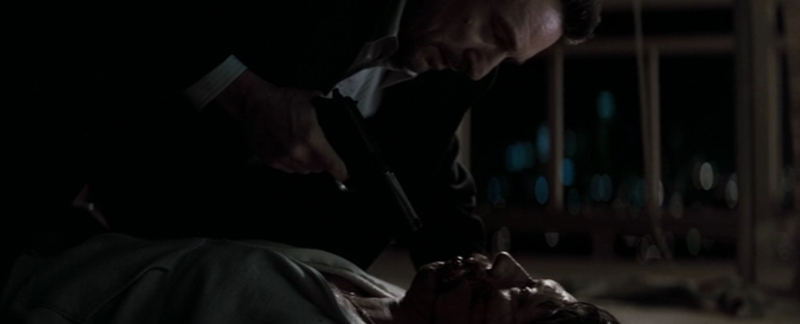
The film still leaves a powerful impact, mostly because of Mann’s brilliant direction. From the incredible co-ordination of the action scenes to his own introspective script, the filmmaker takes every opportunity to draw out as much tension and drama as possible from his material. Additionally, the steely blue colour palette of Dante Spinotti’s cinematography feels modern and stylish whilst emphasising the film’s rich themes. Intimate close-ups capture the heartbreak and loss experienced whilst the strong contrast adds a Neo-noir quality to the film.
What’s captured best is the sheer solitude of the city: L.A feels like the loneliest place in the world under Mann’s lens, even in a crowded diner. So many characters within Heat feel as if they’re on their own island, stranded from others and unable to connect. The world of crime isn’t only traumatic, it’s isolating, leaving in its wake a sense of grief and loss that’s impossible to shake.
Heat lives up to its title. It’s a crackling crime drama that redefined the heist movie and reached grander heights thanks to Mann’s keen understanding of human nature. Under the cat-and-mouse games lies a sorrowful examination of broken men and the impulses they can never tame. It is a mature film for its sober approach to an often glamourised subject, blurring the lines between good and bad and never offering an happy solution for the sake of it. 25 years on, this is still the crowning glory in Michael Mann’s body of work.
USA | 1995 | 170 MINUTES | 2.35:1 | COLOUR | ENGLISH

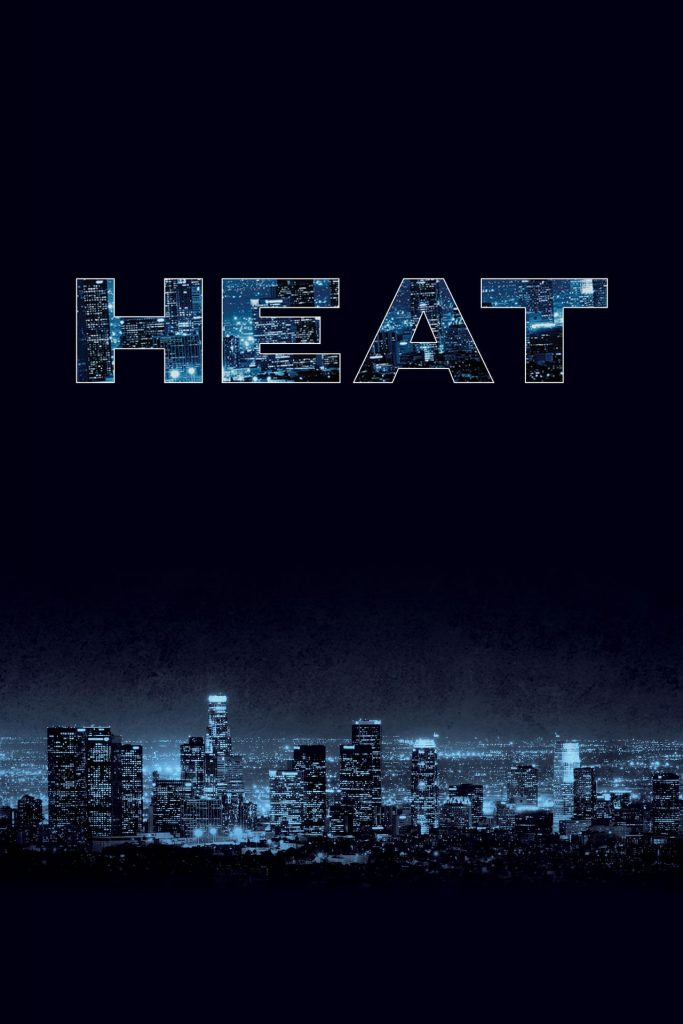
writer & director: Michael Mann.
starring: Al Pacino, Robert De Niro, Tom Sizemore, Diane Venora, Amy Brenneman, Ashley Judd, Mykelti Williamson, Wes Studi, Ted Levine, Jon Voight & Val Kilmer.
